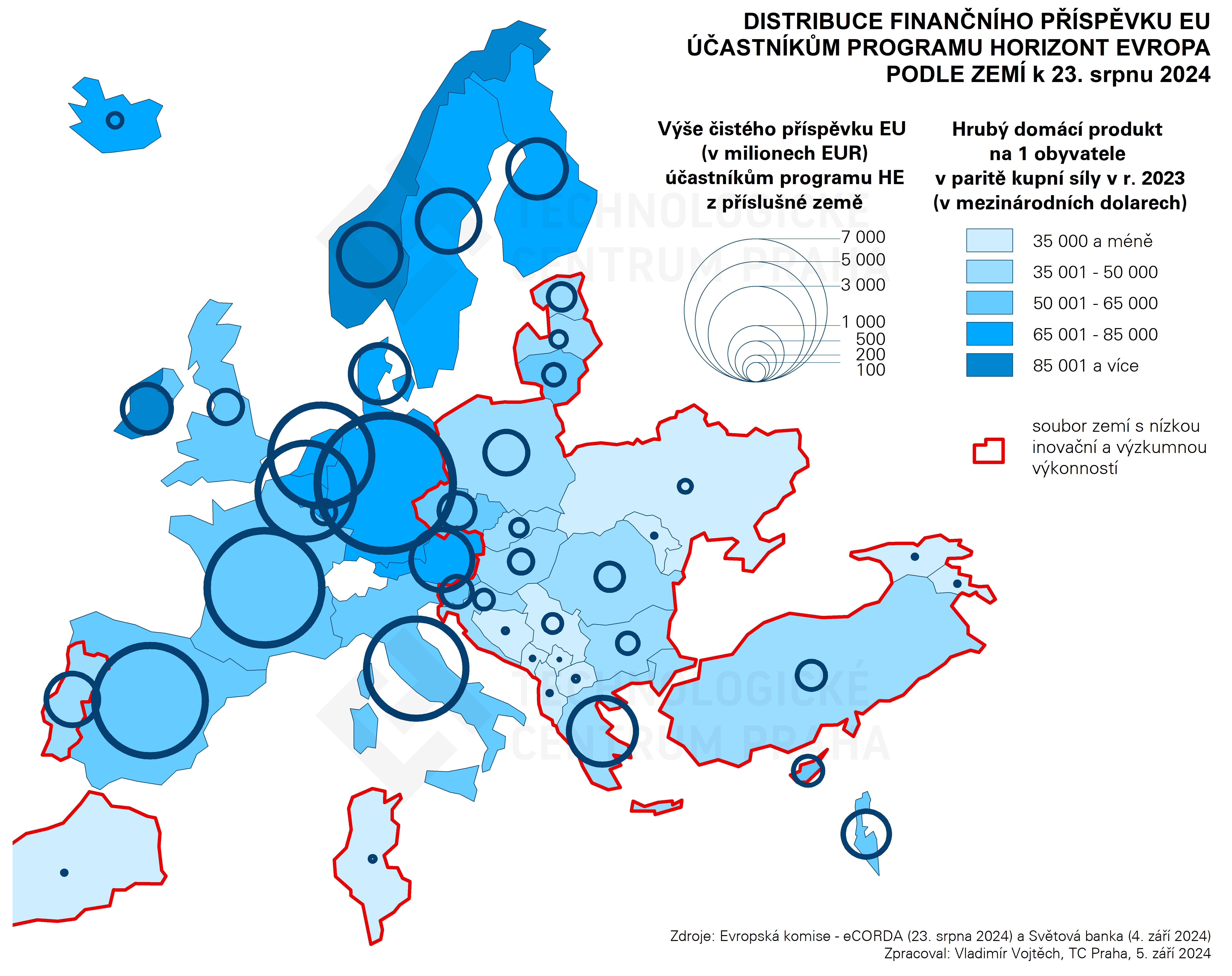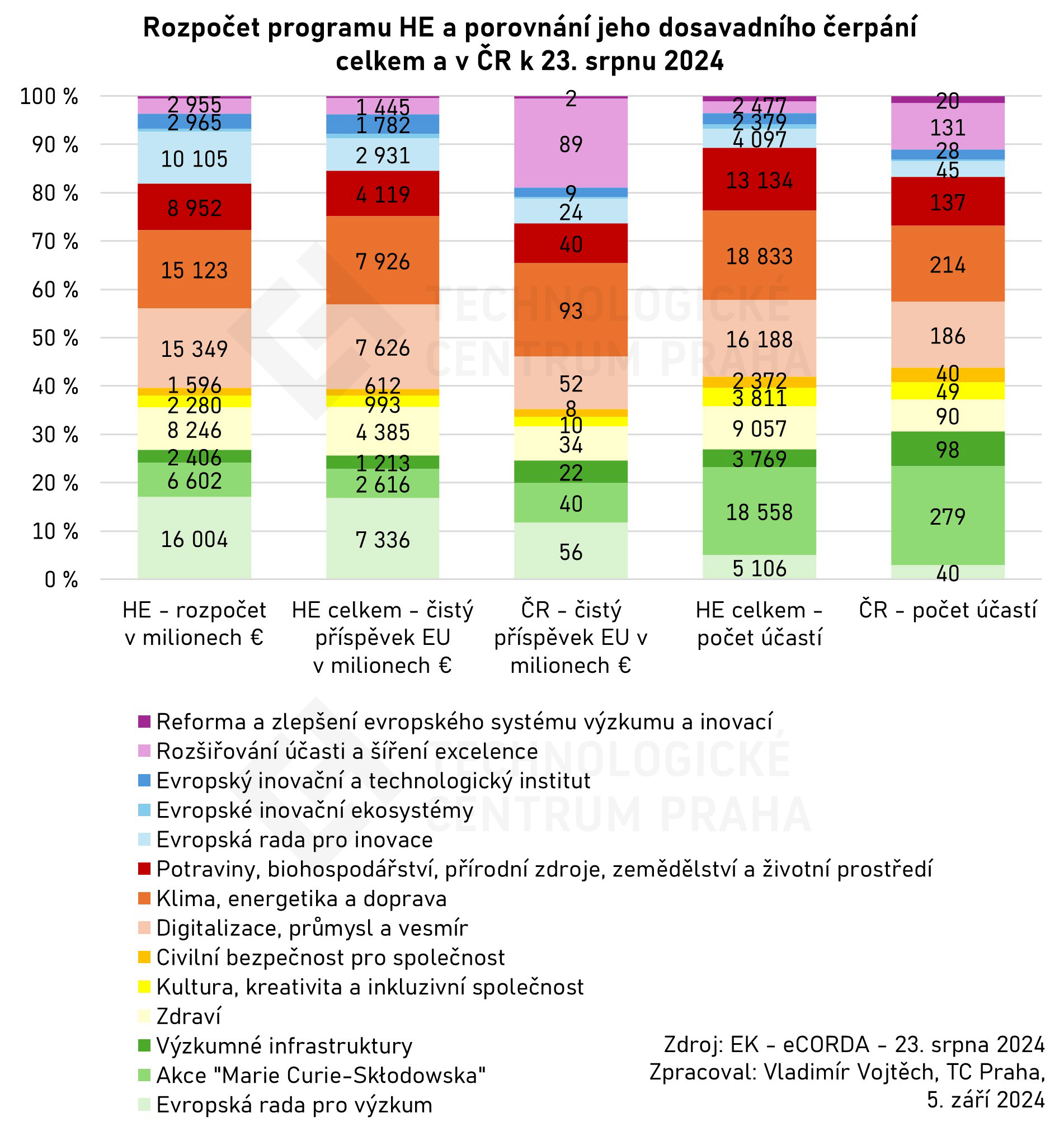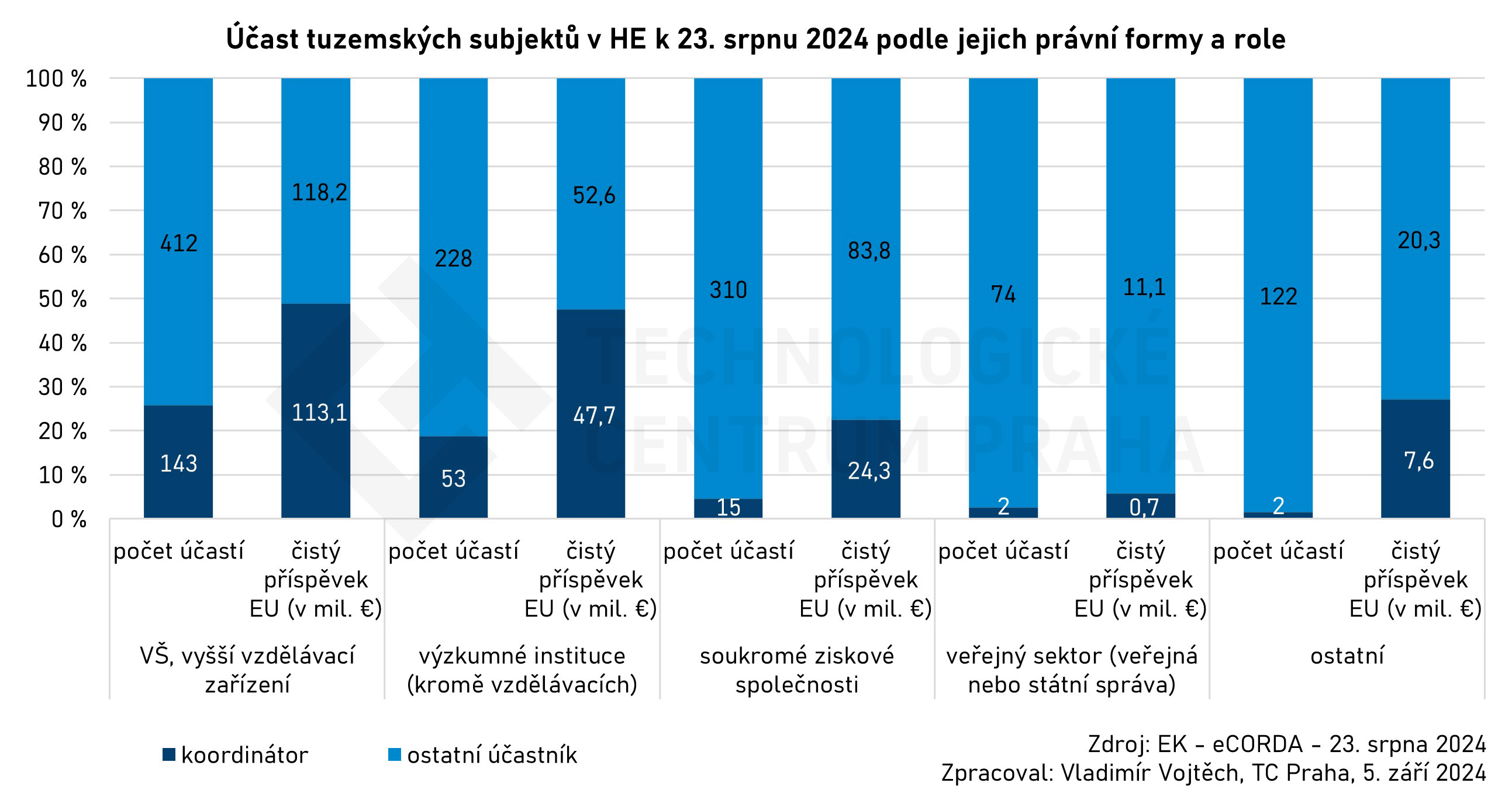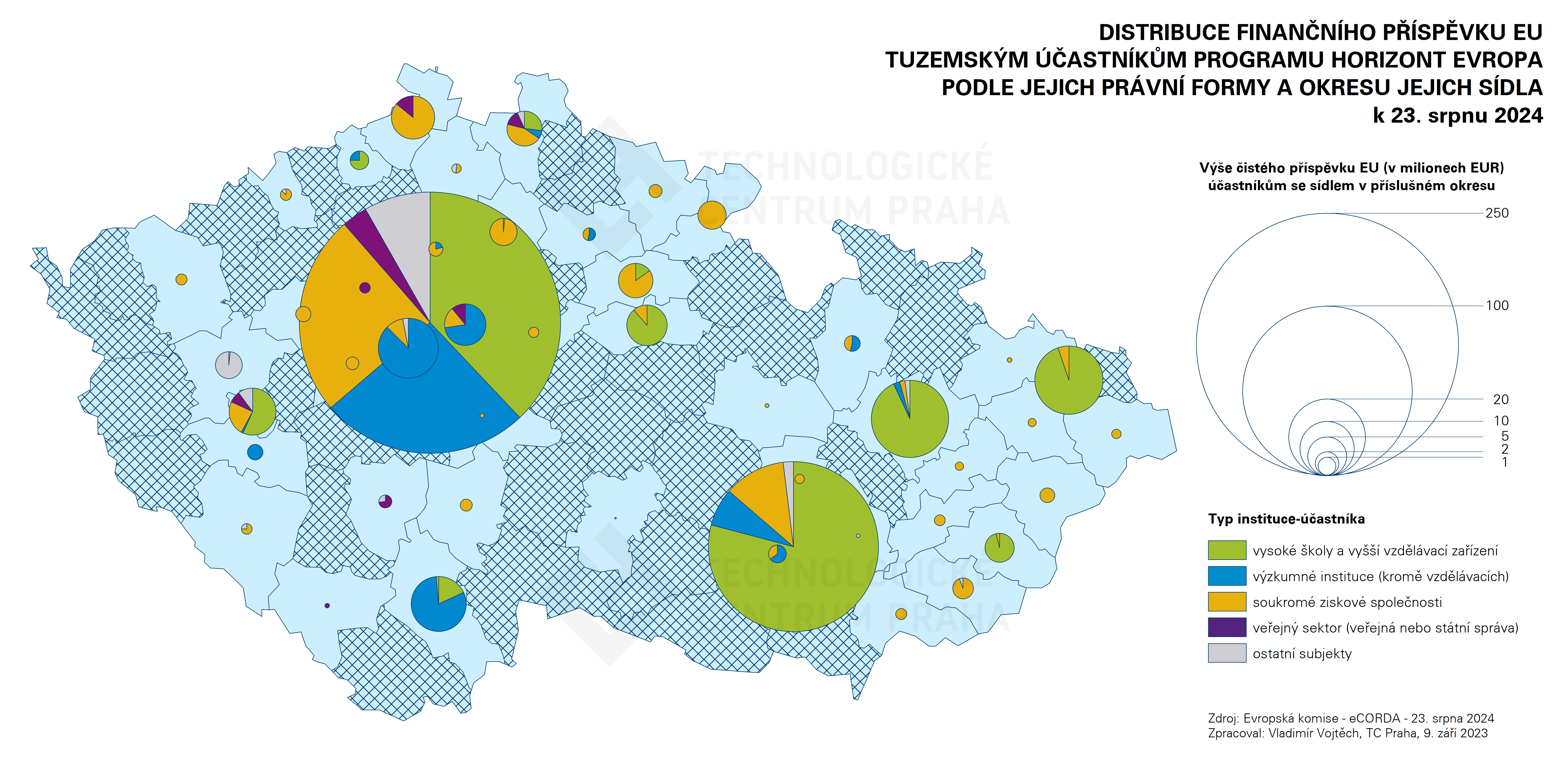Showcase your research at the Falling Walls Lab MSCA 2025 pitch competitions
06/05/2025

As of 23 August 2024, the European Commission's eCORDA database recorded 1,361 funded participations for the Czech Republic in 956 Horizon Europe ("HE") projects. As of the same date, Czech participants had claimed a net EU contribution of €479 million. Among the 45 HE Member and Associated Countries, the Czech Republic has long maintained its 17th position in terms of both the number of participations and the net EU contribution. By comparison, Poland has long been ranked 16th in both indicators (1,838 participations with a total claimed net EU contribution of €668 million), Slovenia is ranked 18th in participation (1,115 participations) and 19th in claimed EU funding (€357 million). The ranking of the Czech Republic, but also of Poland or Slovenia, fully corresponds to the overall economic performance of these countries - in terms of GDP per capita in purchasing power parity in 2023 (according to World Bank data), the Czech Republic was 19th among the EU member states and HE programme associated countries, Slovenia 18th.

Legend: Left – net EU contribution (in € million) to participants from particular country as of 23rd August 2024. Right – gross domestic product per capita in purchasing power parity in 2023 (in international dollars). Widening countries in a red outline.
Sources: European Commission (eCORDA) – 23rd August 2024 and World Bank – 5th September 2024
Prepared by: Vladimír Vojtěch, TC Prague, 5th September 2024
As of August 2024, the HE programme overall recorded 102,000 funded participations in 15.6 thousand projects with a claimed net EU contribution of €43.5 billion. Germany (11.5 thousand), Spain (11.4 thousand), Italy (9.9 thousand), France (9.4 thousand), the Netherlands (6.4 thousand) and Belgium (5.6 thousand) reported the highest number of participations. The highest net EU contributions were claimed by participants from Germany (€6.9 billion), France (€4.9 billion), Spain (€4.6 billion), the Netherlands (€3.8 billion), Italy (€3.7 billion) and Belgium (€3.5 billion). The set of countries with a lower innovation and research performance (so-called Widening countries) accounted for 20.1 thousand funded participations in 5.9 thousand projects with a net EU contribution of €6.5 billion.
The structure of current participation (08/2024) in the HE programme is shown in the graph below. Participants from the Czech Republic reported 417 participations in Pillar I (Excellent Science) of the HE programme, claiming €118 million. In Pillar II (Global Challenges and Competitiveness of European Industry) there were 716 Czech participants with a claimed net EU contribution of €235 million. Within Pillar II, the highest participation is in the Climate, Energy and Transport cluster (214 Czech participation and €93 million claimed) and Digitisation, Industry and Space cluster (186 Czech participation and €52 million claimed).

Note: Budget of the Horizon Europe Programme and comparison of its overall spending and spending in the Czech Republic as of 23rd August 2024
First column – HE programme budget in € million; second column – HE programme overall net EU contribution in € million; third column – net EU contribution in € million to HE programme participants from the Czech Republic; fourth column – HE programme overall number of participations; fifth column – number of participations from the Czech Republic in HE programme.
Legend: Top-down (i.e. from violet colour to light green colour) – Reforming and enhancing the European R & I system; Widening participation and spreading excellence; The European Institute of Innovation and Technology (EIT); The European Innovation Ecosystems (EIE); The European Innovation Council (EIC); Food, Bioeconomy, Natural Resources, Agriculture and Environment; Climate, Energy and Mobility; Digital, Industry and Space; Civil Security for Society; Culture, Creativity and Inclusive Society; Health; Research Infrastructures; Marie Skłodowska-Curie Actions (MSCA), European Research Council (ERC).
Source: European Commission – eCORDA – 23rd August 2024. Prepared by: Vladimír Vojtěch, TC Prague, 5th September 2024
In our previous post of 18 April 2024, we dealt with Czech participation in joint untertakings within the clusters Digitisation, Industry and Space and Climate, Energy and Mobility. In this post, we mention Czech participation in the so-called European Co-programmed Partnerships (thus updating the post of 13 June 2023) within these clusters. These are initiatives through which the EU, in cooperation with public and private partners, seeks to address complex problems that require the interaction of a large number of actors from different parts of value chains and countries. In the Digital, Industry and Space cluster (Cluster 4), Czech actors are involved mostly in partnerships
Together, these 3 partnerships accounted for one fifth of the Czech participation and 29% of the net EU contribution claimed by Czech entities in Cluster 4.
In Cluster 5 Climate, Energy and Mobility, Czech actors participate most in partnerships
Together, these four partnerships accounted for one-sixth of the domestic participation and one-seventh of the net EU contribution claimed by Czech entities in Cluster 5.
By legal form, higher education institutions dominated among Czech HE participants as of August 2024. They participated 555 times and claimed 231 million. The highest EU contribution was claimed by Masaryk University (€52 million), Charles University (€38 million), Czech Technical University in Prague (€27 million), Palacký University in Olomouc (€20 million) and Czech University of Life Sciences in Prague (€19 million).
Czech businesses and research institutions claimed a similarly high net EU contribution. Businesses €108 million, research institutions €100 million. Businesses reported a higher number of participations, 325; research institutions 281. One fifth of the net EU contribution to Czech companies was accounted for by Honeywell International s.r.o. (€21 million), which is a major Czech participant in the aviation Joint Undertakings (Clean Aviation, SESAR3). The second largest domestic corporate beneficiary is Chart Ferox, a.s., a producer of cryogenic equipment and systems for the storage, transport and end-use of liquefied gases (€5.9 million). The third is AŽD Praha s.r.o. (€ 4.6 million), a supplier and manufacturer of signalling, control and communication technologies, especially for railway transport.
Among Czech research institutions, the highest net EU contribution was claimed by the Institute of Physics of the CAS (€18 million), the Institute of Organic Chemistry and Biochemistry of the CAS (€9.5 million), the Biological Centre of the CAS (€8.8 million), the J. Heyrovský Institute of Physical Chemistry of the CAS (€4.9 million), Institute of Molecular Genetics of the CAS (€4.6 million) and Institute of Biotechnology of the CAS (€ 4.6 million).
Project coordination plays an important role. As of August 2024, 215 projects were coordinated by Czech entities. For these projects, they have claimed a net EU contribution of €193 million. This represents two fifths of the total net EU contribution claimed by domestic participants. Coordinators were most represented among higher education institutions and research institutions, with coordination bringing them around half of their net EU contribution.

Note: Participation of Czech entities in the HE programme as of 23rd August 2024 according to their legal form and role
Form left to right – higher education institutions (number of participations, net EU contribution in € million), research institutions (number of participations, net EU contribution in € million), private for-profit companies (number of participations, net EU contribution in € million), public bodies (number of participations, net EU contribution in € million), other institutions (number of participations, net EU contribution in € million).
Dark blue: coordinators; light blue: other participants
Source: European Commission – eCORDA – 23rd August 2024. Prepared by: Vladimír Vojtěch, TC Prague, 5th September 2024
The regional perspective and the structure of participants in each region remain stable. The highest net EU contribution is claimed by participants from Prague (€249 million) and Brno (€105 million). More than €10 million is claimed by participants from the districts of Olomouc (€22 million), Ostrava-město (€17 million), Praha-západ (€13 million) and České Budějovice (€11 million). Prague is home to three-fifths of the companies and research institutions claiming EU funding in the HE programme. Prague and Brno higher education institutions participating in the HE programme claim a similar amount of EU funding – Prague's €94 million and Brno's €83 million (i.e. two-fifths and one-third of the net EU contribution to Czech higher education institutions, respectively).

Note: Regional distribution of net EU contribution to Czech participants in HE programme as of 23rd August 2024 according to their legal form and district of their seat
Legend: Net EU contribution (in € million) to Czech participants residing in particular district. Legal type – green: higher education institutions; blue: research institutions; yellow: private for-profit companies; violet: public bodies; grey: other institutions
Source: European Commission – eCORDA – 23rd August 2024. Prepared by: Vladimír Vojtěch, TC Prague, 9th September 2024
At the end of this contribution, a brief mention of the participation of Czech entities in the HE project proposals should be added. Czech participations were recorded 6,227 times (in 4,561 projects), 1,368 of them as coordinators. The net EU contribution requested in project proposals by Czech entities amounted to €2.5 billion.
Summary:
As of August 2024, the Czech Republic reported 1,361 funded HE participations with a claimed net EU contribution of €479 million. It holds its long-standing position among EU Member States and countries associated to the HE programme. Czech participants are dominated by higher education institutions - particularly those based in Prague and Brno. Businesses and research institutions are similarly represented, with around 60% of both types of organisations participating in the HE programme based in Prague. Project coordination plays an important role in the Czech participation in the HE programme, providing higher education and research institutions with half of their net EU contribution.
Of particular importance is the participation of Czech organisations in so-called co-programmed partnerships focusing on artificial intelligence, data, robotics, batteries, photonics, zero-emission road transport and sustainable industrial production. The Czech Republic coordinates 2 projects in the partnership on artificial intelligence, data and robotics, and 1 project in the partnership on sustainable industrial production.
Prepared by: Vladimír Vojtěch, TC Prague, vojtech@tc.cz, 09.09.2024
06/05/2025
04/05/2025
02/05/2025